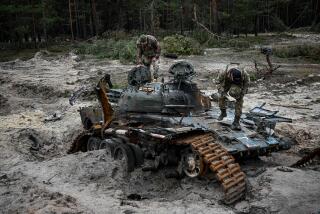Conservative leads in Chile election
In a vote that could signal the end of the center-left coalition that has governed Chile since the end of the Pinochet military dictatorship, right-wing billionaire Sebastian Pinera came out on top in Sunday’s presidential election, setting the stage for a runoff with former President Eduardo Frei next month.
FOR THE RECORD:
Chile’s election: An article in Monday’s Section A about the presidential election in Chile said three communists were elected to Congress for the first time since Salvador Allende was elected in 1973. Allende was elected in 1970. —
With 98% of votes counted, Pinera had 44% and Frei, of the ruling Concertacion coalition, had 30%. A runoff will be held Jan. 17. In third place was Marco Enriquez-Ominami, a socialist congressman with 20% of the votes, followed by communist Jorge Arrate, who got 6%.
Pinera, 60, who has a doctorate in economics from Harvard, was runner-up in the 2005 election, which was won by socialist President Michelle Bachelet. He comes from a political family that includes former ministers and diplomats. He owns a professional soccer team, TV station and minority interest in LAN Chile airline.
The results conform with preelection surveys and exit polls conducted by local TV and radio stations and the Catholic University. Pinera needed 50% plus one of total votes to win outright. Voting is obligatory in Chile; more than 8 million votes were cast.
Although the majority of Enriquez-Ominami and Arrate voters are expected to support Frei, 67, in the second round, Pinera is nonetheless favored to win the runoff and become the first freely elected right-wing president since 1958, political analyst Ricardo Israel said.
Pinera, of the Coalition for Change, won support among voters with his call for improved education, streamlined bureaucracy and greater emphasis on industrializing the economy. He promised to create a million new jobs. He also courted gay voters and abortion rights advocates.
“We feel millions of Chileans have bet their future on us,” Pinera said Sunday after casting his vote at a Santiago school.
Concertacion candidates have ruled Chile since the nation returned to democracy in 1990 after 17 years under Gen. Augusto Pinochet.
Though he expected Pinera to win, analyst Israel said that the candidate’s victory is not assured and that he expects an extremely tight runoff.
“Don’t forget that Pinera and the other right-wing candidate combined won more than 40% in the first round in 2005 and that Pinochet got more than 40% in 1989 in the first election after the return to democracy, but were ultimately defeated in the runoffs by the Concertacion,” he said.
Sunday’s vote was the first presidential election since the 2006 death of Pinochet, who ousted socialist President Salvador Allende in 1973.
Bachelet was limited to one term under the constitution and leaves office March 11. She enjoyed sky-high approval numbers for her wide-ranging social programs benefiting the poor, elderly and women. But many voters appeared most concerned with Chile’s economy, which has been battered by the global economic crisis.
Enriquez-Ominami, whose father was killed by Pinochet’s forces after the coup, said through a spokesman that his share of votes showed Chile has begun to accept far-left parties.
Sen. Andres Chadwick, a Pinera supporter, said the voting totals for Pinera and the two far-left parties all “mark a change” and are a sign that Chileans want different leadership after two decades of Concertacion rule.
Three communists won seats in the new Congress, the first time since Allende was elected in 1973.
Kraul is a special correspondent.
More to Read
Start your day right
Sign up for Essential California for news, features and recommendations from the L.A. Times and beyond in your inbox six days a week.
You may occasionally receive promotional content from the Los Angeles Times.






